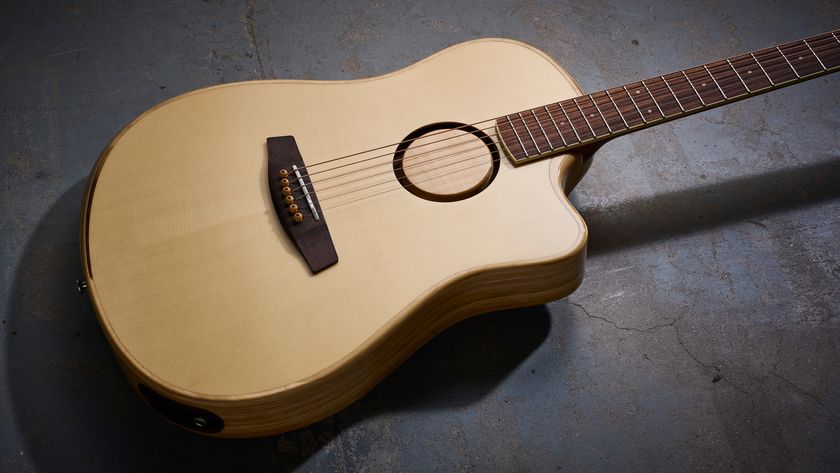The 30 greatest blues guitarists of all time
They woke up this mornin...
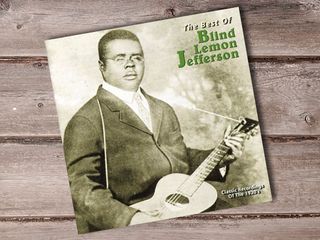
Blind Lemon Jefferson
From Delta trailblazers to electric masters, this is a countdown of the 30 best blues guitarists of all time as chosen by you. So sit back, grab your diddly bow and prepare to be humbled...
Regarded by many as the father of Texas blues, much about Jefferson's life, including his date of birth, cause of death and even the degree of his blindness, is disputed.
However, between 1926 and his death in 1929, Jefferson definitely recorded around 100 tracks for Paramount Records, a few of which were issued under the pseudonym Deacon L J Bates. Notable cover versions of Jefferson's songs include The Beatles' take on Matchbox Blues (via Carl Perkins), and Bob Dylan's See That My Grave Is Kept Clean, which featured on his 1962 debut album.
Listen: Blind Lemon Jefferson - Black Snake Moan
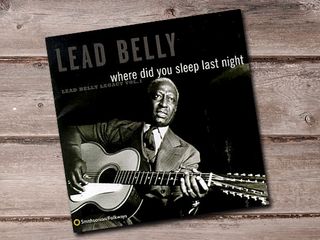
Huddie 'Lead Belly' Ledbetter
The King Of The 12-string's music, much of which he adapted from traditional folk songs, has provided a rich songbook for innumerable artists since his death in 1949.
Even if you don't think you know Lead Belly's songs, you almost certainly know The House Of The Rising Sun, Midnight Special, Goodnight Irene, Where Did You Sleep Last Night and Black Betty, albeit through intereprations by other musicians.
Much more than just a blues guitarist, Lead Belly is a monolith in the history of American popular music.
Listen: Lead Belly - Where Did You Sleep Last Night
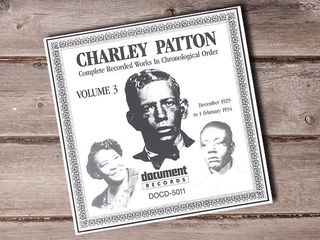
Charley Patton
Charley, or Charlie Patton died in 1934 aged just 42 in his home state of Mississippi, but his importance to the evolution of Delta blues, and thus 20th Century popular music as a whole, is incalculable.
The most influential blues musician in history? Almost certainly. Howlin’ Wolf, John Lee Hooker and Robert Johnson were just a few that he inspired.
Decades before rock ‘n’ roll, Patton would regularly play the guitar behind his head or back during raucous live performances.
Listen: Charley Patton - Rattlesnake Blues
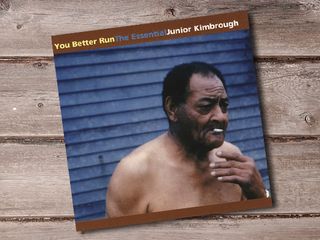
Junior Kimbrough
Mississippi singer/guitarist Junior Kimbrough sadly passed away in 1998, but his mid-tempo style based on drones and syncopated counterpoints has been hugely influential, not least with The Black Keys.
In 2005, the Ohio blues-rock duo recorded a whole album of Kimbrough songs in tribute, (hear Keep Your Hands Off Her here), its title Chulahoma a reference to the location of Junior's Place, the Mississippi juke joint that Kimbrough owned and operated.
Listen: Junior Kimbrough - Lord, Have Mercy On Me
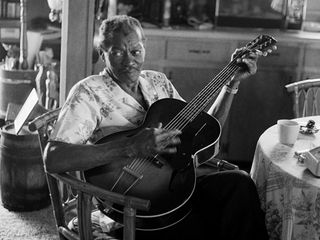
Clarence 'Gatemouth' Brown
Born in Louisiana but raised in Texas, Gatemouth's professional musical career began as a drummer and he could play a mean violin, but it was the multi-instrumentalist's guitar playing that brought him fame.
Unhappy at being pigeonholed as 'just' a bluesman, Gatemouth absorbed a wide array of influences, stating simply, "I play American and world music, Texas-style."
Listen: Clarence 'Gatemouth' Brown - Pressure Cooker (live)
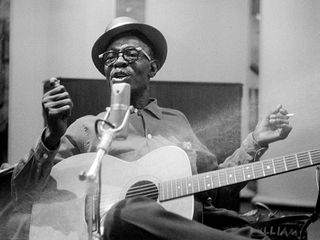
Lightnin' Hopkins
Another giant of Texas blues, Sam 'Lightnin'' Hopkins cut his teeth accompanying Blind Lemon Jefferson at informal church gatherings.
A young Jimi Hendrix would develop an interest in the blues through listening to Lightning Hopkins with his father, while Hopkins' distinctive fingerstyle acoustic playing incorporated elements of lead work that foreshadowed the blazing electric blues of the mid-to-late 1960s. Hopkins was also one hell of a storyteller in the talking blues tradition.
Listen: Lightnin' Hopkins - Gin Bottle Blues
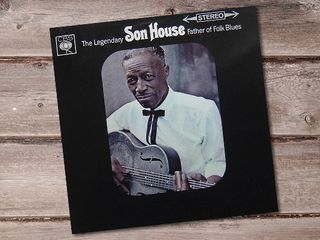
Son House
Son House is one of the true originators, a man whose music sounds older than time, resonating with an intensity rarely matched in the popular music canon.
An influence on Muddy Waters and Robert Johnson, Son House was rediscovered in the 1960s after nearly two decades of retirement, and it's the recordings from this period that represent the most satisfying listening experience for any student of the blues, whether a cappella, or with that ancient voice underpinned by House's signature slide playing. The greatest Delta bluesman of them all?
Listen: Son House - Death Letter Blues (live 1970)
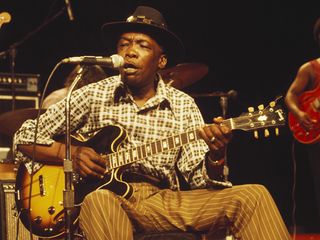
John Lee Hooker
The enduring image of John Lee Hooker's rhythmic Delta boogie is of the man sat alone, stomping his foot to create a beat and improvising rhythmic guitar accents that evoke the sound of a whole band arrangement. And then there's that outrageous voice...
Hooker's recording career began in 1948 when Modern Records released Boogie Chillen' as a single. There are few better debut singles in the history of recorded music, and without it, it's hard to imagine the likes of Led Zeppelin, Canned Heat or ZZ Top sounding anywhere near as rump-shaking.
Listen: John Lee Hooker - Boogie Chillen'
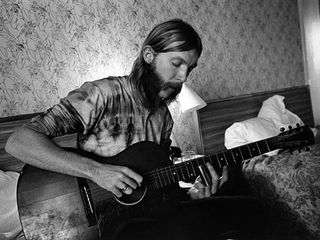
Duane Allman
Killed in a motorcycle accident in 1971 aged just 24, Duane Allman's wonderful slide playing in the outro of the Derek And The Dominos classic Layla is his best-known work, but that's just a small part of the story.
Allman's performance on Wilson Pickett's Hey Jude not only made Eric Clapton's ears prick up, but also got him the gig as full-time sessioneer at Muscle Shoals and saw him play on songs by the likes of Aretha Franklin, Otis Rush, Percy Sledge and many more. However, his Les Paul playing alongside Dickey Betts in The Allman Brothers Band cemented his place as an American guitar hero.
Listen: The Allman Brothers Band - In Memory Of Elizabeth Reed
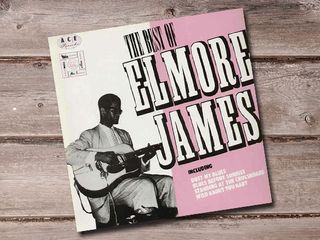
Elmore James
Moonshine, hunting with guns and dogs and driving fast were among the passions of a man whose slide playing is one of the most recognisable sounds in blues music.
Heavily influenced by Robert Johnson, with whom he may have played, in 1951 James took Johnson's version of I Believe I'll Dust My Broom, added volume and searing, violent slide playing and made it his calling card. Almost every electric slide player since acknowledges his influence.
Listen: Elmore James - Dust My Broom
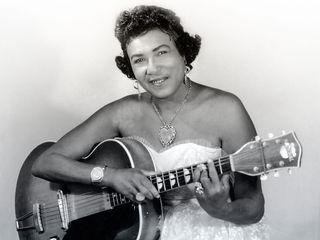
Memphis Minnie
A hard as nails blueswoman with a tough sound and a deceptively genteel image, Memphis Minnie was one of the first female blues players to show that the ladies get the blues - and can express it on guitar - just as much as the men.
Check out her jumping ode to, well, STIs basically, Kissing In The Dark.
LIsten: Kissing In The Dark
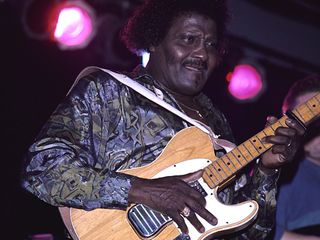
Albert Collins
The Ice Man from Texas is one of the undisputed legends of the Telecaster. Informed by Texas, Chicago and Mississippi blues styles, Collins influenced the likes of Stevie Ray Vaughan and Gary Moore and after toiling in relative obscurity for many years, found fame, and Grammy Awards, in the 1980s.
Collins' stinging fingerstyle and capo'd open F-minor tuning is just part of the story; there's real art in the breathing spaces between those licks.
Listen: Albert Collins - If Trouble Was Money (live)
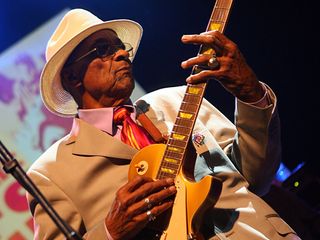
Hubert Sumlin
A former sideman for Howlin’ Wolf and Muddy Waters, the Mississippi-born and Arkansas-raised Hubert Sumlin would get many an aficionado's nomination for second guitar in an all-star fantasy blues band.
For evidence of his all-round brilliance, check out this clip in which Sumlin, ’55 Goldtop in hand, teaches you how to play the classic Howlin’ Wolf song Smokestack Lightning.
Listen: Howlin' Wolf - Little Red Rooster
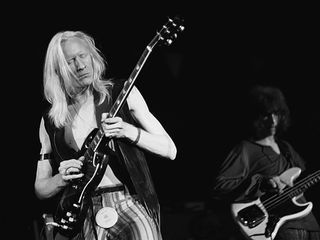
Johnny Winter
Albino blues guitarist Johnny Winter got his big break in December 1968 when Michael Bloomfield invited him to get up and jam at the Fillmore East in New York.
Within a few days, Columbia Records representatives who witnessed his performance of BB King's It's My Own Fault signed him for $600,000 - then the biggest advance in the history of the music business.
1977 saw him fulfil a childhood ambition and collaborate with Muddy Waters on the Hard Again LP, which Winter produced and performed. The partnership would yield two more studio long players and a pair of Grammy Awards.
Listen: Johnny Winter - Dallas

Joe Bonamassa
He kick-started his career opening for BB King aged 12, and since then things have only got bigger and better for the blues prodigy done good, the one and only Joe Bonamassa.
A hard-working, thoroughly modern bluesman with a direct line to tone that sweats, Bonamassa seems to gain more and more converts to his sophisticated playing with each year.
Listen: Chains And Things (live)
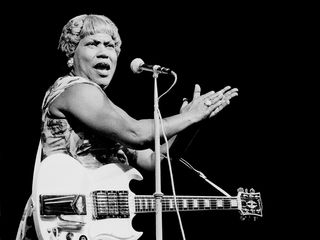
Sister Rosetta Tharpe
The original soul sister, Rosetta Tharpe made her SG sing and influenced a who generation of early rock and rollers in the process.
Soulful, simple and sweet, her playing - not to mention her knock-your-socks-off voice - make her a must-listen. Check out the solo she rips out in Up Above My Head:
Listen: Up Above My Head (Live)

Jack White
The greatest bluesman of the 21st century? We'd be willing to say so - and we'd be hard pushed to name a contemporary artist who plays with the unbridled passion and skill of Jack White on a good day.
The White Stripes were all rough and ready blues intensity, and while Jack has continued on without Meg, his inimitable playing style continues to impress.
Listen: The White Stripes - Ball And Biscuit (live under Blackpool lights)
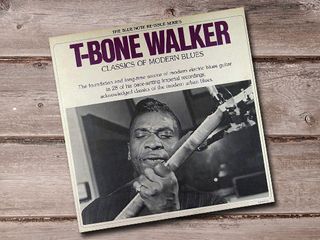
T-Bone Walker
Another protégé of Blind Lemon Jefferson, the young Aaron Thibeaux Walker would act as Jefferson's guide, being taught the basics of blues guitar in return for his services.
One of the first blues musicians to pick up an electric guitar, Walker was a huge influence on the likes of BB King, Chuck Berry and Jimi Hendrix, the latter imitating Walker's habit of playing the guitar with his teeth onstage.
Listen: T-Bone Walker - Call It Stormy Monday (live)
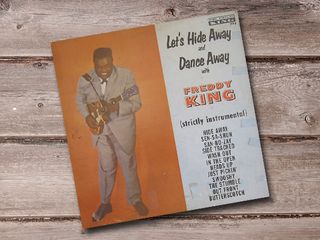
Freddie King
Freddie is probably the most underrated of the Three Kings of blues guitar alongside BB and Albert.
The album cover above is said to have inspired Eric Clapton to buy a Les Paul, and he then went on to cover King's Hideaway on the seminal Bluesbreaker's 'Beano' album.
Another Bluesbreaker, Peter Green, was a King fan, covering The Stumble in '67. Although his influence on the Brit blues boom of the 1960s is unquestionable, it's easy to overlook just how great, melodic and innovative a lead player King was himself.
Listen: Freddie King - The Stumble

Albert King
The Velvet Bulldozer stood well over six feet - either 6'4" or 6'7" depending on who you believe - and will always be associated with Lucy, the Gibson Flying V that he played left-handed.
A huge influence on Rolling Stone Mick Taylor, Eric Clapton, Joe Walsh, Michael Bloomfield and Derek Trucks, echoes of King's less-is-more phrasinf and expressive bends can be heard in much modern electric blues guitar.
Listen: Albert King - Born Under A Bad Sign (live 1981)
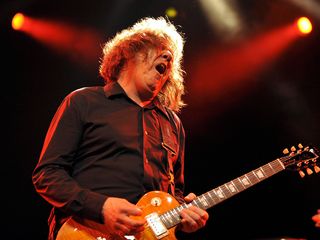
Gary Moore
Has anyone ever made a Les Paul scream like the mighty Gary Moore?
Northern Ireland's finest guitar-slinging export, his bombastic, passionate playing set many a record alight, whether it was his own solo work or alongside the likes of Thin Lizzy.
Don't Believe A Word (live with Thin Lizzy)
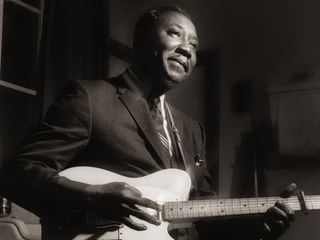
Muddy Waters
Influenced by Mississippi Delta pioneers Son House and Robert Johnson, Muddy Waters would go on to be described as The Father Of Chicago Blues, the city to which he first moved in 1940, while still in his mid-twenties.
In 1960, his amazing performance at the Newport Jazz Festival turned on whole new generation to his brand of electrified blues and his influence can be felt from The Rolling Stones and Jimi Hendrix right through to contemporary hip-hop. A true legend.
Listen: Muddy Waters - Mannish Boy (live 1971)
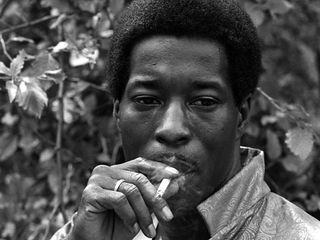
Buddy Guy
Buddy Guy grew up playing a diddly bow in Lettsworth, Louisiana, but his rise to fame after moving to Chicago in 1957 was curtailed by a conservative Chess Records who preferred to use him to back the likes of Muddy Waters, Howlin' Wolf and Sonny Boy Williamson, rather than attempt to capture the flamboyance of his live performances.
Luckily he found appreciation amongst the British blues guitarists of the 1960s and his loud, distorted style was key to modernising electric blues. In the words of Eric Clapton: "Buddy Guy was to me what Elvis was for others." Praise indeed.
Listen: Buddy Guy - First Time I Met The Blues (live)
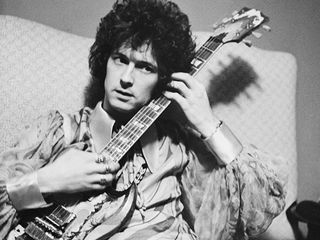
Eric Clapton
The Yardbirds, John Mayall & The Bluesbreakers, Cream, The Dirty Mac, Blind Faith, Derek And The Dominos... Throughout his long and varied career, the blues has always been at the heart of Eric Clapton's music.
Though famously labelled 'God' by an Islington graffitti artist in 1967, Clapton cites Robert Johnson's influence as paramount, describing him as "the most important blues musician who ever lived". Clapton's nods to Johnson have been numerous over the years, from reworking Cross Road Blues in Cream to recording a whole album of covers in 2004, including Love In Vain.
In terms of his own impact on electric blues, for many, Clapton's playing and guitar sound on 1966's 'Beano' album with the Bluesbreakers is unsurpassed.
Listen: Eric Clapton - Cocaine (live)

Peter Green
For some the greatest British blues guitarist of them all, Peter Green's playing first as Eric Clapton's replacement in John Mayall's Bluesbreakers and then in Fleetwood Mac is at times heart-stoppingly beautiful.
Few guitarists can claim to have made an electric guitar sound so sweet, so soulful or so lyrical.
Listen: Fleetwood Mac - Need Your Love So Bad
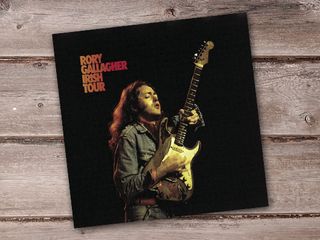
Rory Gallagher
Irishman Rory Gallagher's fiery blues was perhaps under appreciated in his lifetime, but as the years go by, the sound of that battered 1961 Stratocaster continues to resonate.
When he died in 1995, Eric Clapton described Gallagher as "the man who got me back into the blues", and whether alone or part of power trio Taste, Ireland's first guitar hero was guaranteed to play with passion and vitality. Sadly missed.
Listen: Rory Gallagher - A Million Miles Away (live)
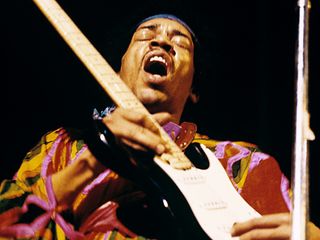
Jimi Hendrix
What can you say about the man that many regard as the greatest guitarist who ever lived?
Although not strictly blues given his voyages into heavy rock and psychedelia, make no mistake, Jimi played some of the finest and most incendiary blues guitar ever to grace a concert hall or be cut into a slice of vinyl.
Of course, the insanely gifted southpaw could get a killer sound out of a 12-string acoustic too. One of popular music's handful of true genuises.
Listen: The Jimi Hendrix Experience - Red House (live at Woodstock)
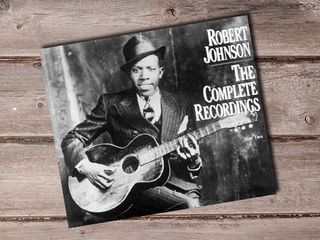
Robert Johnson
The Robert Johnson legend is one of the most evocative in the history of 20th Century music.
Dead by poisoning in 1938 aged 27, the shadowy figure claimed to have sold his soul to the devil at a Mississippi crossroads in exchange for otherworldly musical abilities will forever live on through the handful of recordings he made and his staggering influence on Western popular music.
Although Johnson is occasionally dismissed as unremarkable alongside Delta blues contemporaries Charley Patton and Son House, and there has even been speculation regarding whether the King Of The Delta Blues Singers albums are even at the right pitch and speed, his impact on bluesmen and rock 'n' rollers that followed on both sides of the Atlantic is impossibe to deny.
Listen: Robert Johnson - Sweet home Chicago
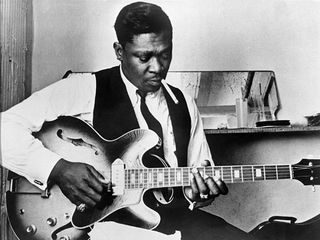
BB King
BB King will always be one of the first names that rolls off the tongue when one is asked to name great electric blues players.
Inspired to get an electric guitar by T-Bone Walker, the biggest of the three Kings of the blues guitar has an unmistakeably smooth, lyrical style in sharp contrast to the raw sound of many of his Mississippi contemporaries.
After an estimated 15,000+ performances across six decades, BB King is still performing live. A true inspiration.
Listen: BB King - Why I Sing The Blues (live in Africa 1974)
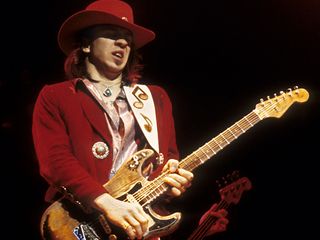
Stevie Ray Vaughan
Ladies and gentlemen, we have a winner.
MusicRadar's battle royal of the blues guitar was hard-fought, but in the end you handed the accolade of greatest blues guitarist of all time to the precociously talented Texan with curious dress sense who could play a Stratocaster like nobody before or since.
The late, great Stevie Ray Vaughan's style was informed by Hendrix, Otis Rush, Lonnie Mack, Buddy Guy, Albert King and many more, but his technique and sound have become the holy grail for hundreds of thousands of guitarists in the years since his passing.
Now, all that remains is to sit back and listen to the guitarist that you've voted as the greatest blues player of all time...
Listen: Stevie Ray Vaughan - Pride And Joy (Live at Montreux 1982)

MusicRadar is the number 1 website for music makers of all kinds, be they guitarists, drummers, keyboard players, djs or producers...
- GEAR: We help musicians find the best gear with top-ranking gear round-ups and high- quality, authoritative reviews by a wide team of highly experienced experts.
- TIPS: We also provide tuition, from bite-sized tips to advanced work-outs and guidance from recognised musicians and stars.
- STARS: We talk to musicians and stars about their creative processes, and the nuts and bolts of their gear and technique. We give fans an insight into the actual craft of music making that no other music website can.
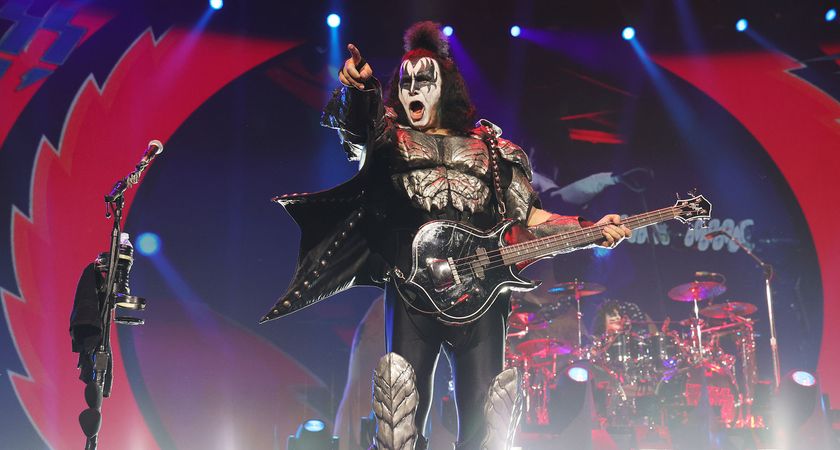
“AI is about as close to reality as you can ever imagine”: Gene Simmons discusses the prospect of a virtual KISS and says the “future of entertainment is here”
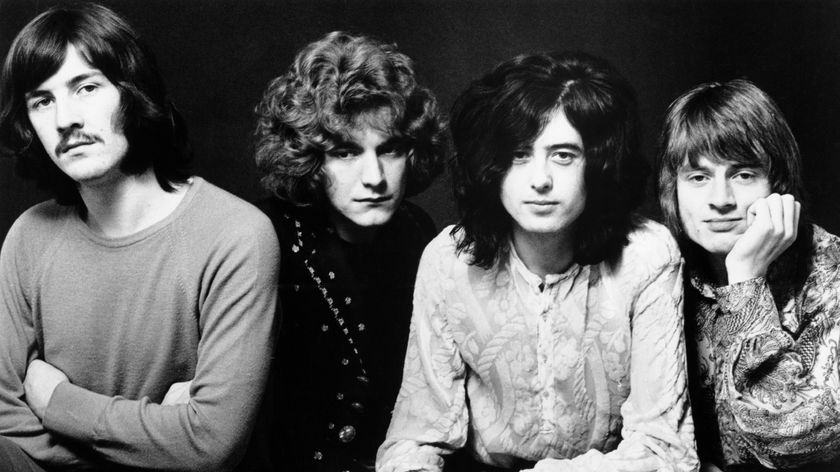
“When we heard the album we were speechless!”: How Led Zeppelin's debut blew Peter Frampton away - and inspired countless guitarists

“AI is about as close to reality as you can ever imagine”: Gene Simmons discusses the prospect of a virtual KISS and says the “future of entertainment is here”

“When we heard the album we were speechless!”: How Led Zeppelin's debut blew Peter Frampton away - and inspired countless guitarists
Most Popular







